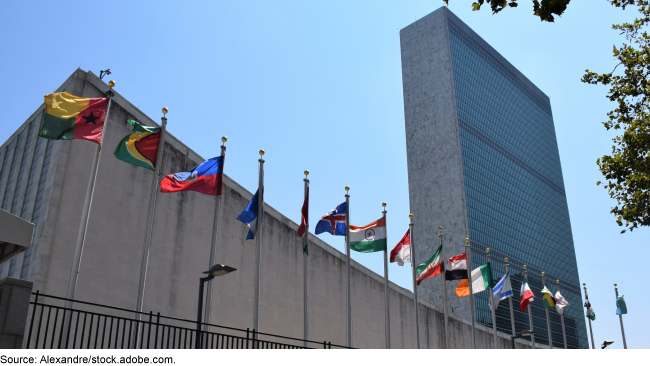United Nations: Information on Independent Human Rights Experts and Their Work
Fast Facts
In 1967, the UN established a system to promote and protect human rights around the world. It selects independent experts and gives them a mandate to report and advise on specific human rights issues. As of 2024, the UN had 46 thematic (such as human trafficking) and 14 country-specific mandates.
This Q&A report provides information on this system. For example:
These human rights experts may serve in the role for a maximum of 6 years
Funding comes from the UN budget and voluntary contributions from member states and other entities such as the Ford Foundation
The Council has a process to screen applicants for conflicts of interest

Highlights
What GAO Found
In 1967, the United Nations (UN) established a system of independent human rights experts, known as Special Procedures, to promote and protect human rights around the world. The system involves UN member states proposing mandates to address thematic or country-specific human rights issues. Mandates can cover a variety of civil, cultural, economic, political, or social issues.
The UN's Human Rights Council is responsible for establishing the mandates and selecting the human rights experts, known as mandate holders, to lead the efforts. Some mandates represent long-term human rights issues, with multiple individuals serving as mandate holders over time. Mandate holders undertake country visits, engage in advocacy, and raise public awareness, among other things. They are selected for a maximum of 6 years.
Current and former mandate holders for active mandates have come from 99 countries and territories, according to UN information. The U.S. has been the most represented country with 16 mandate holders. From 1992 to May 2024, mandate holders completed 1,582 visits to 177 countries and territories, according to UN information.
Mandates are funded by a combination of UN regular budget funding, voluntary contributions from UN member states, and direct external funding from entities such as non-governmental organizations. The UN budget funding should provide administrative and professional staff for the mandate holders and the costs associated with some country visits. This funding, however, does not cover the full cost of the work carried out by the mandate holders. Some donors provide additional, voluntary contributions to support the work of the mandate holders. For example, the U.S. provided voluntary contributions of $102.5 million from fiscal years 2015 to 2023 to support the work of the mandate holders, among other things, according to Department of State. Germany, Switzerland, and Russia each contributed about $3 million to specific mandates over the same period, according to OHCHR annual reports. In addition, the Ford Foundation provided more than $6 million in direct external funding to specific mandates in fiscal years 2015 to 2023.
The Human Rights Council and the mandate holders have created mechanisms to identify and address potential conflicts of interest.
- A Human Rights Council resolution says that mandate holders cannot hold decision-making positions in their governments or in any other organization that could create a conflict of interest.
- Mandate holders can solicit advice from a committee of six mandate holders about whether activities in which they wish to engage could create a conflict of interest. This could include taking a new job, according to officials. The mandate holders have created their own internal guidance to help address potential conflicts of interest.
- In 2015, in part to address concerns about the potential for conflicts of interest, the mandate holders began to publicly report sources of external funding they received to carry out their work.
State is the primary U.S. government department that mandate holders coordinate with during visits, according to officials. State sets up these meetings with executive agencies, but mandate holders set up their own meetings with Congress, state and local governments, or other entities. GAO's review of UN data shows that mandate holders have completed 31 official visits to the U.S. since 1992. Although State is willing to work with many, if not most, mandate holders, it does not work with some because the U.S. government disagrees with the premise of the mandate, according to State officials. For example, State has not communicated with the Special Rapporteur on the situation of human rights in the Palestinian territories occupied since 1967.
Why GAO Did This Study
The UN established the special procedures system in 1967 to promote and protect human rights around the world. The system is composed of mandates that cover a variety of human rights issues: civil, cultural, economic, political, and social, as well as issues relating to specific groups or country situations. As of November 2024, the UN had 46 thematic and 14 country-specific mandates.
GAO was asked to review the UN special procedures system of independent human rights experts. This report provides, among other things, information on the processes for establishing mandates and selecting mandate holders, how the special procedures system is funded, including external funding from 2015 to 2023, and how conflicts of interest are identified and resolved, among other things.
GAO reviewed UN resolutions, special procedures guidance, and information on external funding and who has served as mandate holders. GAO also interviewed officials from the United Nation's Office of the High Commissioner for Human Rights and the Department of State.
For more information, contact Chelsa Kenney at (202) 512-2964 or KenneyC@gao.gov.
